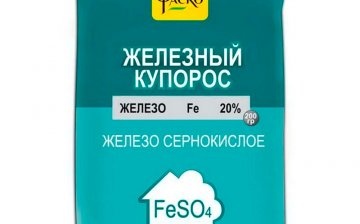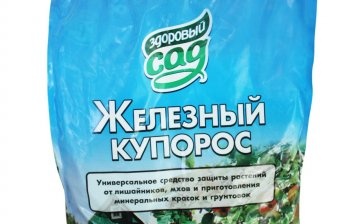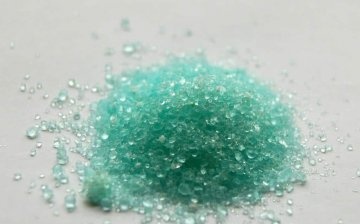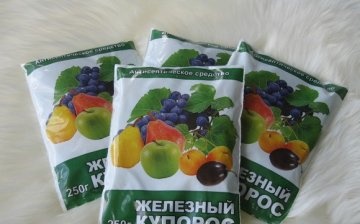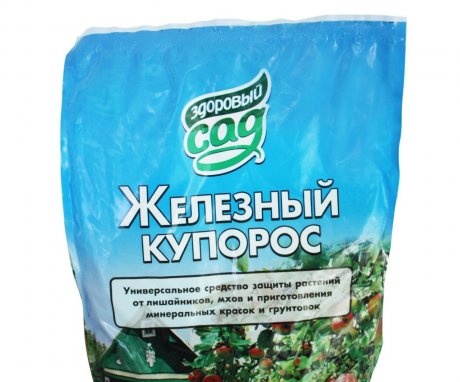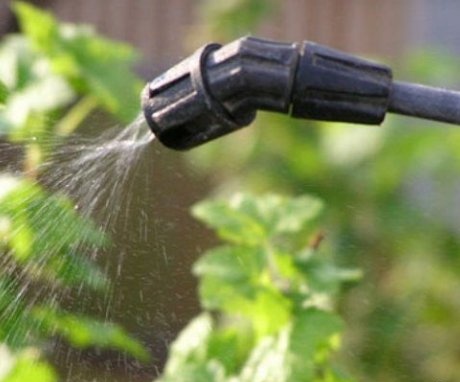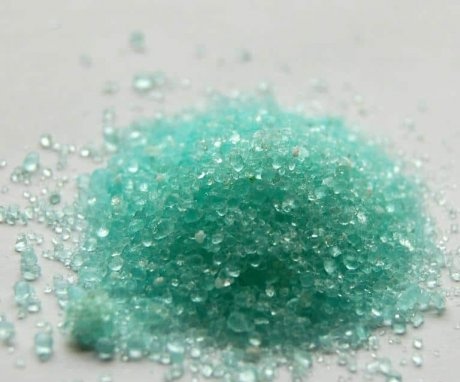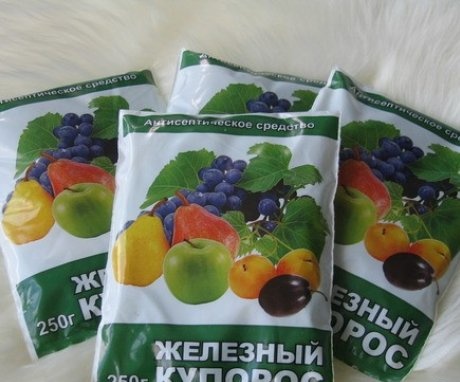Iron vitriol: application in gardening in spring and autumn
Iron sulfate has been used by gardeners for a long time. It is included in the list of substances that help to grow a good harvest, protect it from pests and fungal diseases. The most common use of this substance is in liquid form for spraying. But vitriol is also used as a fertilizer. You can easily buy vitriol at any gardening store. The price for it is small, so iron sulfate is very popular.
Content:
- What it is? The action of ferrous sulfate
- Application methods and recommendations
- Rules of use and preparation of the solution
- Pros and cons of ferrous sulfate
What it is? The action of ferrous sulfate
Iron sulfate, or ferrous sulfate, is considered almost universal. It is used like fungicide, fertilizer and pest control. But some experts argue that this is a poison and it is not recommended to use it as a fertilizer, otherwise the plants may get sick and die.
There are many articles on the Internet describing how iron sulfate works, its use in gardening in the fall, and especially the effect on plants. Ferrous sulfate is a sulfuric acid salt. It has the form of bluish-green crystals that can dissolve well in water.
Ferrous sulfate is used in various industries, but it has gained the greatest popularity in the field of horticulture.
The main properties of ferrous sulfate:
- It is a contact fungicide. That is, it destroys pathogenic fungi, prevents them from spreading and multiplying, but at the same time it does not penetrate the structure of the leaf.
- Since vitriol does not penetrate into plant cells, it is easily washed off with water, for example, during precipitation.
- Vitriol has a pronounced disinfecting effect, therefore it is used for preventive treatment of saw cuts and hollows.
- A solution of vitriol can be used to treat not only the plant itself, but also the soil to prevent the development of fungal diseases and for disinfection purposes.
- Ferrous sulfate is not a flammable substance, but at the same time it is explosive, therefore it is very important to observe the rules for its storage.
- It is believed that ferrous sulfate acts as a catalyst for the formation of chlorophyll, that is, in fact, this substance enhances and improves plant growth. But this property of ferrous sulfate is disputed by many.
- Vitriol has regenerating properties. It is used in both horticulture and other industries. So, for example, with the help of iron sulfate, gold is purified from impurities.
- Plants need iron, and ferrous sulfate allows you to make up for the lack of this element. For the most part, however, it is used as a fungicide and insecticide, therefore, it is very important to follow the rules for using the drug.
Iron and copper sulfate should not be confused. These are completely different substances. It is impossible to prepare Bordeaux mixture from ferrous sulfate. Such mistakes can lead to disastrous results for plants.
Application methods and recommendations
Ferrous sulfate is a proven and well-known remedy that has won the trust of many gardeners.Beginners prefer to use chemical fungicides and fertilizers, while more experienced gardeners use iron sulfate.
Iron sulfate is used in the fight against the following diseases:
- Powdery mildew... This fungus spreads very quickly on plants. To stop it, you need to start treatment as early as possible, and it is better to take preventive measures with vitriol. The affected plants seem to be covered with dust, a layer of flour, but upon closer inspection, you can see the spores of the fungus.
- Downy mildew. This disease is also called peronosporosis. At high humidity, fungi begin to multiply rapidly and infect plants, leaving noticeable damage to the leaves and stems. Downy mildew can infect any cultivated plants, spreading through insects.
- Anthracnose... This disease is caused by a fungus called deuteromycete. The effect of the fungus is especially noticeable on the fruits. tomato, cucumbers, grapes, cherries, currants, raspberries, strawberry... In high humidity and extreme heat, this fungus spreads very quickly.
- Coccomycosis. This disease is especially dangerous for cherries, plums and other stone fruits. Coccomycosis first affects the leaves, and then the fruit. Their flesh becomes watery, and brown spots appear on the surface, which significantly spoil the quality of the crop.
- Clusterosporiosis. This fungus is capable of infecting absolutely any part of the plant. Without processing, he easily survives the winter and in the spring again begins to spoil the harvest.
It is also believed that ferrous sulfate helps in the fight against pests, insects, although not all gardeners will agree with this. Ferrous sulfate is used as a fertilizer to saturate the root system of plants with iron. This helps to improve the respiration of the plant, its rejuvenation. Therefore, it is advisable to use vitriol for feeding old shrubs and trees. Moreover, it is recommended to carry out exactly the autumn dressing. During the winter, the soil will be saturated with vitriol, iron will be supplied to the plants after spring planting in sufficient quantities.
Rules of use and preparation of the solution
If vitriol is used as fertilizer, you just need to add it to the soil along with compost (1 kg of vitriol is enough for 100 kg of compost). This use is very economical. There is no need to increase the dosage. Fruit and berry trees and shrubs are especially fond of such dressings. This allows you to enrich the soil with iron and accelerate plant growth.
To process plants, you need to prepare a solution of ferrous sulfate. When preparing the solution, you must adhere to the following rules:
- It is believed that ferrous sulfate is not dangerous to human health. It is not highly toxic, but it is still better to avoid contact with skin and mucous membranes. For this reason, it is recommended to use protective gloves, a mask, special clothing, which can then be thrown away. Also, the hair needs to be tucked under the hat.
- Even if nothing gets on the skin during spraying, after the end of the procedure, you need to remove all protective devices and wash yourself well, wash your hands with soap and water.
- Iron sulfate can be used with other drugs, it rarely reacts with them, but it is definitely impossible to mix iron sulfate with lime and preparations containing phosphorus or unstable to an alkaline environment.
- A concentrated solution can harm the plant: burns will remain on the leaves. A solution with a high concentration of ferrous sulfate can only be used for processing cellars. If it is necessary to eliminate mosses and lichens, then it is possible to use a 5% solution, although this concentration is also considered quite high. For grapes, apple trees, pears a 4% solution will be enough. Apricot trees, cherries, plum.
- You need to spray the entire tree or shrub, including branches and trunk. In the autumn, the trunk must be especially carefully processed, since the eggs of insect pests could get under its bark.
If, after use, the product still gets on the skin or mucous membranes, they must be rinsed well with running water. As a rule, ferrous sulfate is easily washed off. If, after rinsing, a burning sensation remains, redness and a rash appear, you need to see a doctor.
Pros and cons of ferrous sulfate
Iron sulfate has both positive and negative sides. This substance cannot be considered absolutely universal. Not every plant survives frequent vitriol treatments well. Subject to the rules of use, the probability of harming the plant decreases.
The positive aspects of ferrous sulfate include:
- Wide range of applications. Iron vitriol will serve as an excellent remedy in the fight against almost any fungal diseases, as well as lichens and mosses, insects.
- High efficiency. Experienced gardeners note that the effectiveness of iron sulfate in the fight against fungal diseases is higher than that of other chemicals. It works great not only at the stage of prevention, but also if the plant is already damaged.
- Low level of toxicity. Iron sulfate is safe for humans and pets. It does not belong to strong poisons. Side effects can occur only if there is contact of a highly concentrated solution with the skin or mucous membranes. But even in this case, the danger is small if the affected area is quickly and thoroughly rinsed.
- Low price. Unlike many other fertilizers and fungicides, ferrous sulfate has a fairly low price. At the same time, it is economically consumed, which allows it to be used for a long time.
There are also some disadvantages of vitriol. Since it is a fungicide, it is completely useless to use it in the fight against bacterial infections. Also, there is a low efficiency of the drug in the fight against insect pests. If the plant is severely damaged, the treatment will only be effective with other complementary remedies.
If the weather is rainy, the plants will have to be processed several times. The water easily washes away the iron vitriol. Despite the fact that it takes effect about 2 hours after spraying, you need to wait at least a day for a positive effect. The effect ends 2 weeks after application. Use inkstone is possible only at a certain time. Leaves are easily damaged by this substance, so the best period for its use is before bud break and after foliage falls.
More information can be found in the video:



